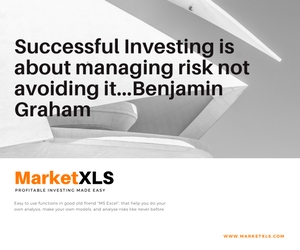Wall Street Analyst Nick Ackerman writes about closed end funds and income yielding plays on Seeking Alpha. Lately Mr. Ackerman has been seeing opportunities for healthy income in the biotech sector…this week he shares an exclusive note with our readers…
Tekla Capital Management LLC provides investors two funds that have significant exposure to the Biotech sector. Tekla Healthcare Investors ($HQH) and Tekla Life Sciences Investors ($HQL) both provide diversified exposure to the Healthcare industry and specifically focus on Biotech.
For those unfamiliar with Closed-end funds and how they operate, they have some advantages and disadvantages like any other type of investment. Closed-end funds are just mutual funds that, as their name suggests, are closed. What this means is that once the shares are issued they are not created and destroyed like the traditional open-end mutual fund. The shares go through an IPO like a typical stock. These shares also trade throughout the day just like a stock on the NYSE. There are occasions where they can increase share count by doing rights offerings that increase the fund’s assets.
Closed-end funds also typically offer high distributions, this is through the use of leverage or options strategies that the funds can utilize. But don’t confuse these high “yields” with dividends. They are comprised of different sources, and thus, they are considered distributions because they can be from; income, short-term gains, long-term gains, and the often misunderstood return of capital. Sometimes return of capital can be listed as a source throughout the whole year until you get the final tax characteristics, and they are reclassified as realized long-term gains. This is a whole other topic though that is highly debated.
One of the other key benefits of closed-end funds is that they don’t trade at their NAV. Like I mentioned above the shares trade throughout the day, and are dependent on supply and demand. You can literally buy $1.00 for less than $1.00, which is the case for both the funds I want to bring attention to.
There is a drawback to closed-end funds, however, and this is why some investors are put off by them. Since they are funds they have managers, and these managers are paid fees. This makes closed-end funds have expense ratios. This can also be seen as a benefit though, as these managers are actively navigating the market to try and achieve the best outcome for their investors. The fund gets larger, and they collect higher fees. So an investor needs to be mindful of this when looking at a potential closed-end fund to purchase.

 Tekla Healthcare Investors ($HQH)
Tekla Healthcare Investors ($HQH)
The Tekla Healthcare Investors fund’s description is, “primarily invests in healthcare industries with an emphasis on mid to large cap biotechnology and pharmaceutical growth companies with a maximum of 40% of the fund’s assets in restricted securities of both public and private companies.”
HQH currently holds companies like Celgene Corporation, Amgen Inc., Gilead Sciences, Inc. and Vertex Pharmaceuticals Incorporated. Just to name a few of their top holdings. The portfolio consists of 64.2% in the Biotechnology sub-sector. This is followed up by Pharmaceuticals at 15.7% and Life Sciences Tools & Services at 5.8%, to name their top sub-sectors. So as you can see the fund is heavily invested in the Biotech sector in-line with their fund description.
The fund can currently be bought at $19.61 a share, while its NAV is $21.77 a share. This refers back to the above mention that you can purchase shares for less than what the underlying assets are really worth! This gives the fund an attractive discount of 9.92% or just about 90 cents per $1.00 of assets.
Now for the exciting part, the fund currently has a distribution rate of 8.30%, this is paid on a quarterly schedule. The latest distribution paid in March was at $0.41 per share. This fund has what is known as a “managed distribution policy.” This policy states that they will “make quarterly distributions at a rate of 2% of the fund’s net assets.”
Tekla Life Sciences Investors ($HQL)
The Tekla Life Sciences Investors fund is quite similar to the above mentioned HQH. They describe their fund as, “primarily invests in life sciences and other healthcare industries and will emphasize growing companies with a maximum of 40% of the fund’s assets in restricted securities of both public and private companies.”
In fact, many of the top holdings are very similar to HQH with names like Celgene Corporation, Amgen Inc., Gilead Sciences, Inc. all as the same three top holdings. It differs slightly when looking through the sub-sectors though. Biotech currently makes up 74.6% of the overall portfolio while Pharmaceuticals comes in at 9.8% and Life Sciences Tools & Services at 6.9%. So this fund has an even greater emphasis on the Biotech sector.
HQL currently trades at $16.34 per share, with a NAV per share value of $17.89. This leads to its discount of 8.66%, again meaning that the fund can be purchased on the market for less than what its assets are valued at. It is worth noting though that a fund can sometimes maintain this sharp discounts indefinitely.
For HQL, the distribution policy is the same as HQH, with the fund distributing out 2% of its net assets on a quarterly basis. The current distribution rate is 8.04% and the latest payout was $0.33 per share paid in March.

The Tekla fund family has a great emphasis on specializing on the Healthcare sector. These funds can provide investors the opportunity to gain a wide diversification in the Biotech space all while purchasing just one fund! The high distributions can also be seen as a positive to some investors as they are collecting cash all the while waiting for the next Biotech buying craze.
The long-term investor has been and should continue to be rewarded by making an investment in either of the funds listed above. But, like any investment, closed-end funds aren’t for everyone and one should do their own due diligence to see if an investment fits in with the investor’s goals.
Follow Nick Ackerman’s commentary and analysis at Seeking Alpha






More Stories
IONIS PHARMACEUTICALS: THE LITTLE BIG PHARMA?
HOT BIOTECH STOCKS FOR 2024: THE YEAR WHERE CASH IS KING
BIOMARIN PHARMACEUTICAL: ONE STOCK I WOULD BUY TODAY